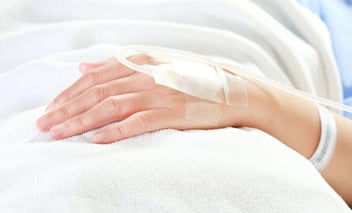For many people with Crohn’s disease, it can be a long road from the first time symptoms appear to receiving the correct diagnosis. This disease can be a bit of a mimic – with symptoms that can be mistaken for other conditions. The autoimmune-related GI inflammation of Crohn’s disease can affect different parts of the GI tract in different people, adding to the difficulty physicians may face in pinning down an accurate diagnosis.
Once Crohn’s disease has been determined to be the correct diagnosis, it’s important to promptly start a treatment plan to control the progression of this condition. This is because patients who achieve remission after one year of treatment are much more likely to not suffer from a progression of this disease.
This conclusion was based on new research presented at the Congress of European Crohn’s and Colitis Organisation, in which 244 patients with an early diagnosis of Crohn’s disease were divided into two groups. One group (122 patients) took medications based only on their clinical symptoms; which meant that if symptoms were mild, then fewer medications were given. The other group, based on 122 patients, was given a more aggressive treatment plan, in which they were prescribed a step-up therapy in response to a combination of clinical symptoms and inflammatory biomarkers.
This more involved “tight control” strategy early in the course of Crohn’s disease benefited patients in this group by the end of the year-long study, as indicated by 45.9% achieving mucosal healing after 48 weeks (compared to 30.3% of those in the standard treatment group). In addition, deep remission was achieved in a significantly greater number of the more aggressive treatment group (36.9% vs. 23%).
Achieving clinical remission early in the disease course benefited the long-term health of patients. In summary: early diagnosis is important, as well as early treatment, when it comes to Crohn’s disease.
Sources
Yzet C, et al. Abstract OP35. Presented at: Congress of the European Crohn’s and Colitis Organisation; Mar. 7-9, 2019; Copenhagen.
Colombel J, et al. Abstract OP225. Presented at: UEG Week; Oct. 28 to Nov. 1, 2017; Barcelona.
Related Posts
Eat Right for Crohn’s Relief
Crohn’s disease, along with a similar condition called ulcerative colitis, together make up the...
Crohn’s Disease: Heading Toward its 100th Birthday
Could a cure for Crohn’s disease be in the future? There are several research directions that are...
How Sweet It’s Not: Crohn’s and Splenda
More than 1.5 million Americans suffer from inflammatory bowel diseases, which include both...
Infusion Confusion?
For patients with Crohn’s disease, finding out that a recommended treatment could include...





